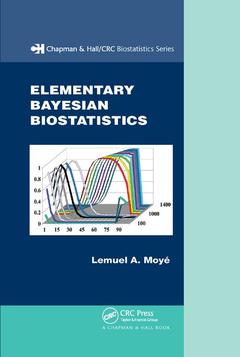Elementary Bayesian Biostatistics Chapman & Hall/CRC Biostatistics Series
Auteur : Moye Lemuel A.

Bayesian analyses have made important inroads in modern clinical research due, in part, to the incorporation of the traditional tools of noninformative priors as well as the modern innovations of adaptive randomization and predictive power. Presenting an introductory perspective to modern Bayesian procedures, Elementary Bayesian Biostatistics explores Bayesian principles and illustrates their application to healthcare research.
Building on the basics of classic biostatistics and algebra, this easy-to-read book provides a clear overview of the subject. It focuses on the history and mathematical foundation of Bayesian procedures, before discussing their implementation in healthcare research from first principles. The author also elaborates on the current controversies between Bayesian and frequentist biostatisticians. The book concludes with recommendations for Bayesians to improve their standing in the clinical trials community. Calculus derivations are relegated to the appendices so as not to overly complicate the main text.
As Bayesian methods gain more acceptance in healthcare, it is necessary for clinical scientists to understand Bayesian principles. Applying Bayesian analyses to modern healthcare research issues, this lucid introduction helps readers make the correct choices in the development of clinical research programs.
Date de parution : 10-2019
15.6x23.4 cm
Date de parution : 07-2007
Ouvrage de 376 p.
15.6x23.4 cm
Thèmes d’Elementary Bayesian Biostatistics :
Mots-clés :
Control Group Event Rate; Posterior Distribution; posterior; Sample Size Computations; distribution; Acute Liver Failure; prior; DBP; procedures; Bayes Procedure; law; Negative Binomial Distribution; total; Posterior Probability Distribution; probability; Prior Distribution; clinical; Ovulation Day; trial; Prior Information; loss; Unconditional Distribution; Loss Function; Gamma Distribution; Binomial Distribution; Likelihood Principle; Arrival Rate; Poisson Distribution; Beta Distribution; Conditional Probability Distribution; Prior Belief; Bayesian Trialists; Accurate Prior Information; Hdl Level; Reuse Time



